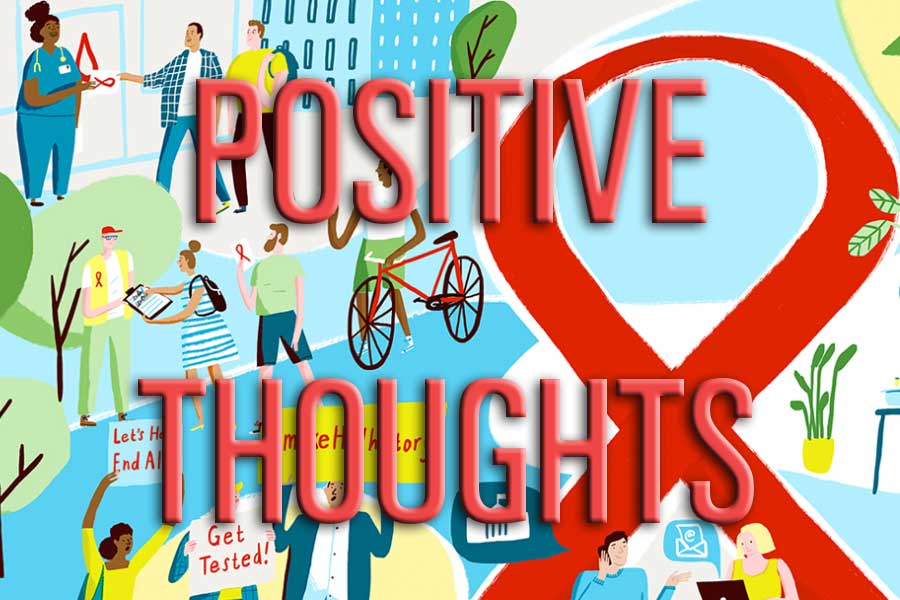It’s been another tumultuous year, but at least in 2018 we started talking about HIV again.
Let’s face it, we’ve had a rough year. More senseless shootings, more #MeToo controversies, more attacks on trans and immigrant rights – and more budget cuts affecting those living with HIV.
As 2018 drew to a close, many in our country’s most marginalized communities may have been feeling a bit lost, a bit hopeless, and a bit depressed. And though it’s understandable one could feel this way, we must also take note of the many positives that happened in 2018 – thanks to the indomitable strength of the human spirit. And some sound science.
One silver lining for those living with HIV this year was simple, yet enormously powerful. We started talking about HIV again. It seems that after the panic around the initial epidemic of the 1980s began to subside – especially once the highly effective antiretrovirals used today were first developed in 1996 – we just stopped talking about HIV and AIDS. And since we stopped talking about it, we stopped learning about it. In turn, many misconceptions around the condition have remained solidly in place since. This was a “gay disease” after all – so it became even less of a concern once we had the meds to “take care of it.”
Stigma is the root of why we’re uncomfortable talking about HIV. We only want to sweep something under the rug when it makes us feel uncomfortable, frightened or ashamed. But the Centers for Disease Control and Prevention’s latest estimate of more than 38,500 new infections in the U.S. in 2015 proves we can no longer afford to be silent. Fortunately, several well-known people courageously came forward about being HIV-positive in 2018 in order to strike back at this long-enduring stigma.
ABC reporter Karl Schmid proved you can be a successful, charming, healthy heartthrob – while being HIV-positive – when he opened up about his status in March in moving Facebook post.
Other celebs, some directly inspired by Schmid’s bravery, also opened up about their status in 2018 – like beloved E! entertainment reporter Marc Malkin and his husband, Fabian Quezada-Malkin.
Young Broadway talents Hernando Umana (“Kinky Boots”) and Dimitri Moise (“The Book of Mormon”) also opened up about being poz this year, bringing the much-needed conversation around HIV to millennials, a group with one of the fastest-growing infection rates in the U.S.
These celebs turned HIV activists have at least one thing in common – they’re all super passionate about promoting the global “U=U” consensus now endorsed by hundreds of major health organizations all over the world. The campaign was created to educate the world about the science behind “Undetectable=Untrans-mittable,” which simply means when one’s viral load drops to undetectable (common for those on treatment today), they are unable to transmit HIV to others.
Umana, who bravely came out as gay in addition to being poz on Instagram in August, also included a photo of himself with the post. In it, the 30-year-old performer held a sign that read: “Living with HIV.”
“I stand on the shoulders of the millions of people who had to suffer and die from this disease. I stand on the shoulders of the gay men who were forced out of the closet in such a scary time. These men and woman fought and died to get to where we’re at now – to take a pill at night and never have to worry about dying. To get the disease to a point where it is IMPOSSIBLE to transmit (undetectable). How can I be ashamed of this? I honor their legacy by telling my story. So let’s talk about it. Let’s ask questions. Take your PrEP. Use condoms. Be SAFE. Let’s end this stigma forever and eventually end HIV forever!”
Desirée Guerrero is the associate editor of Plus magazine. This column is a project of Plus, Positively Aware, POZ, TheBody.com and Q Syndicate, the LGBT wire service. Visit their websites – http://hivplusmag.com, http://positivelyaware.com, http://poz.com and http://thebody.com – for the latest updates on HIV/AIDS. For more information about the National AIDS Memorial Grove and the Pedro Zamora Young Leaders Scholarship, visit AidsMemorial.org.

